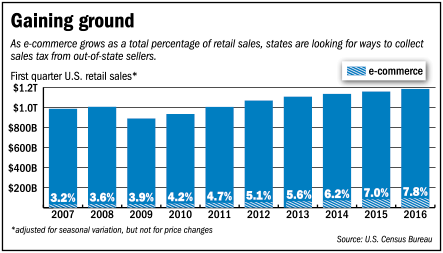Subscriber Benefit
As a subscriber you can listen to articles at work, in the car, or while you work out. Subscribe NowLawmakers are advancing a bill that would compel large, online retailers to collect and send sales taxes to the state—injecting Indiana into a national tussle over the issue as online shopping continues to grow rapidly.
 Kenley
KenleyThe bill, authored by Senate Appropriations Chairman Luke Kenley of Noblesville, applies to out-of-state retailers with annual sales in Indiana of more than $100,000 or at least 200 transactions involving Hoosiers—even if the retailers have no physical presence in the state.
Existing law applies only to retailers with stores in Indiana.
The debate over sales tax collections from so-called remote sellers has been raging for decades, but it has become more potent of late as e-commerce has exploded.
As a first step, the state made a deal with online giant Amazon and started collecting taxes from it in 2014. But tax revenue from purchases at other major retailers, including eBay, has remained elusive.
And the state is feeling the crunch in its sales tax revenue.
“With more and more online shopping, it’s creating a bigger hole in our sales tax receipts,” Kenley said.
A 2011 report from the Indiana Fiscal Policy Institute and Ball State University estimated that lost sales taxes then were likely $40 million to $114 million, with a “similar to lower amount lost due to traditional mail-order sales.”
 Ketzenberger
KetzenbergerIFPI President John Ketzenberger told IBJ “it’s safe to say it’s more than that” now, given the trends in online sales.
In fact, the National Conference of State Legislatures has estimated Indiana could be losing about $400 million annually.
Proponents of Kenley’s bill include brick-and-mortar retailers, who say it is a matter of tax fairness.
“They are sort of at a competitive disadvantage in competing with online sellers, given they have to charge sales tax on the same items,” said Bill Waltz, vice president at the Indiana Chamber of Commerce.
 Opponents include online retailers such as eBay, which did not respond to IBJ’s request for comment.
Opponents include online retailers such as eBay, which did not respond to IBJ’s request for comment.
In the past, some lawmakers have also been wary of similar legislation because they see it as a new tax. Ketzenberger said lawmakers are usually “a little careful about whether or not to be tagged as raising taxes.”
But there’s nothing new about imposing a sales tax on online purchases. When retailers don’t collect it, consumers are responsible for paying a “use tax” on the purchase through their annual income tax filing.
The problem is that hardly anyone pays it.
Only about $2 million in use taxes were collected for tax year 2013, according to the nonpartisan Legislative Services Agency. That’s only 25 percent more than in 2008, when Hoosiers paid $1.6 million in use taxes—even though online sales have skyrocketed during that same period.
“Everything you buy online or from a catalog, you’re supposed to declare and pay that tax,” Ketzenberger said. “That’s a ‘trust me’ system. What we’ve found over time is that most Hoosiers don’t declare those purchases and don’t pay the taxes on those purchases. That means that the state is losing out on sales taxes it ought to be able to collect.”
The Senate Tax and Fiscal Policy Committee in late January advanced the bill to the full Senate, which on Feb. 2 approved it 42-1. Republican Sen. Jim Buck, R-Kokomo, cast the lone “no” vote.
Sen. Brandt Hershman, R-Buck Creek, called the bill “an effort to address a widespread compliance problem on a tax that is already due.”
But even if it passes the General Assembly, the state could face an uphill battle enforcing it, a fight that could involve a U.S. Supreme Court case.
The battle has been brewing since 1992, when the Supreme Court ruled in Quill Corp. vs. North Dakota, finding that states may not force vendors without a physical presence in their states to collect and remit taxes.
But states have complained the ruling is outdated. Congress has also considered legislation for several years to let states require online sales tax collections, but the measure has never passed.
Enter South Dakota.
The state in 2016 started requiring online retailers to pay sales tax after crafting a strategic law aimed at challenging the Quill decision. It gave the retailers a few months to comply.
After the deadline passed without compliance from several companies, it sued Newegg, Wayfair and Overstock. It’s a “lawsuit that could have taxing consequences nationwide,” according to a 2016 report from Governing Magazine.
“If the suit makes it to the U.S. Supreme Court—as many believe it will—governments would finally get an answer to their long-awaited question of whether they can collect a sales tax from online purchases,” the report said.
Now, other states have passed bills nearly identical to South Dakota’s. Kenley’s bill “mirrors” South Dakota law as well. He said he hopes Indiana will join the suit.
“This is something that has to be tested in the courts,” he said.
Kenley’s bill would not automatically require affected sellers to pay the tax. The Department of Revenue would have to bring a declaratory judgment action against remote sellers to establish the seller’s obligation to the state—which could lead to legal battles about whether the seller needed to collect the tax.
Waltz said he believes the bill has enough support in the Legislature to pass—and that the issue is ripening nationally.
“We’ve been supportive of [this] effort for a long time,” Waltz said. “A lot of people think it will never happen. But I do think we’re a lot closer than we’ve ever been to changing this to the point where we can actually be authorized to collect a sales tax.”•
Please enable JavaScript to view this content.
